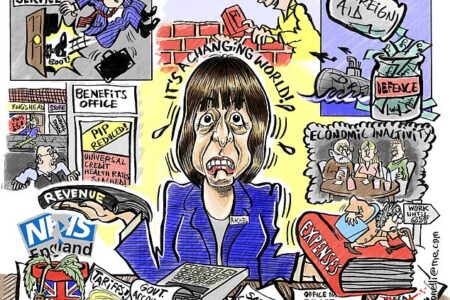We knew the public finances were in a bad way. Just how bad was laid bare yesterday in official forecasts that accompanied Rachel Reeves’s dismal Spring Statement.
Unless Britain starts working smarter and more productively, a near-£50billion black hole will open up in the country’s accounts by the end of the decade, blowing the Chancellor’s ‘non-negotiable’ fiscal rules out of the water.
That’s according to the Office for Budget Responsibility (OBR), the independent watchdog that checks Reeves’s tax-and-spend plans to see if her sums add up.
The huge shortfall – equivalent to adding 9p to the basic 20p rate of income tax – is based on the not unrealistic assumption that Britain’s lousy productivity record persists for the rest of the decade.
Fortunately for Reeves, the OBR thinks productivity, as measured by output per hour worked, will miraculously rebound – despite consistently over-estimating it in recent years.
The OBR’s heroic assumption matters because it allowed the Chancellor not only to meet her ‘ironclad’ target of balancing the books by 2028-29 with a paltry £10billion to spare, but also to avoid more punishing tax raises – at least for now.

Upbeat: OBR’s forecasts have allowed the Chancellor (pictured) to meet her ‘ironclad’ target of balancing the books by 2028-29 with a paltry £10bn to spare
Strong productivity growth – how much more efficiently we as a country use our assets, including labour and technology, to produce more goods and services – is vital because it is needed to raise tax revenues sustainably.
These in turn pay for public services like schools, hospitals and the military, where there are demands for higher spending.
Small wonder then that the OBR says the outlook for productivity ‘is one of the most important and uncertain forecast judgements’.
In its latest update, the watchdog admits previous productivity predictions have been missed by a country mile. But it sticks with its own rosy view that things will get better, even after halving its forecast for economic growth this year to just 1 per cent.
‘Successive past forecasts have proven to be too optimistic as productivity growth has continued to disappoint,’ the OBR lamented yesterday.
Weaker-than-forecast economic growth meant ‘both the level and growth rate of measured productivity have been lower than we expected’, it added.
‘As a result, measured output per hour fell by 0.4 per cent in 2023 and by 1pc in 2024,’ the OBR revealed.
If these woeful productivity trends continue, the £10billion of ‘headroom’ built into its forecasts will be wiped out and the public accounts will plunge £48billion in the red by 2029-30, the OBR projected.
Experts have long warned that the OBR is hiding a huge black hole in the public accounts.
Its renewed forecast that productivity will grow at an annual rate of 1 per cent in each of the next five years – boosted in part by the Government’s ambitious housebuilding plans – is so cheery it is, in the words of Berenberg economist Andrew Wishart, ‘starting to look insane’.
Bank of England governor Andrew Bailey doesn’t go quite so far but he also has his doubts. ‘The story of growth is, I’m afraid, quite clear,’ he said this week. ‘It has slowed markedly in the last 15 years or so, and this has affected the advance of living standards.’
An ageing population and the rise of women in employment coming to a ‘natural end’ meant growth would not arise from more people working, he added.
Bailey had previously noted that the UK population and workforce had grown faster than previously thought, but economic growth had stalled.
‘We can only conclude mathematically that productivity has got much worse,’ he said last month. ‘It’s actually negative.’
The Bank sees potential output per head rising by just 0.7 per cent in 2027, whereas the OBR thinks it will revert to growing by 1.25 per cent over the medium term.
Experts say it is only a matter of time before the watchdog finally smells the coffee and cuts its own productivity estimates.
But it is unlikely to do so in one fell swoop for fear of scaring financial markets, they add.
‘The fiscal position remains vulnerable,’ says Michael Saunders, senior economic adviser at the Oxford Economics think-tank.
‘The OBR has taken a relatively optimistic view on the extent to which planning reform will lift potential output in the next few years, despite widespread shortages of construction workers,’ he added. ‘It remains likely that the OBR will have to downgrade their potential growth projections at some stage.
‘And the Chancellor has again left little headroom against the fiscal rules, leaving (them) vulnerable to even modest revisions to the economic outlook.
Sanjay Raja, chief UK economist at investment bank Deutsche Bank, added: ‘These buffers remain wafer thin.’
The OBR regularly accuses Chancellors of using smoke-and-mirror tactics to hide the truth of the public finances.
But it has conjured up its own ‘fiscal illusion’ as it gazes into the crystal ball of productivity growth. It is surely only a matter of time before the spell is broken and reality bites.
DIY INVESTING PLATFORMS
Affiliate links: If you take out a product This is Money may earn a commission. These deals are chosen by our editorial team, as we think they are worth highlighting. This does not affect our editorial independence.


